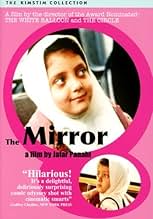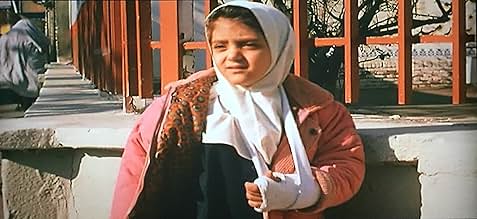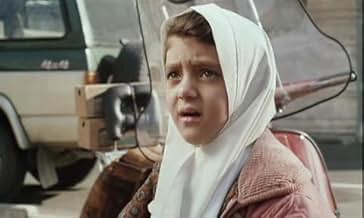IMDb RATING
7.5/10
3.5K
YOUR RATING
When a young girl becomes lost in the hustle and bustle of Tehran, her journey turns into a dazzling exercise on the nature of film itself.When a young girl becomes lost in the hustle and bustle of Tehran, her journey turns into a dazzling exercise on the nature of film itself.When a young girl becomes lost in the hustle and bustle of Tehran, her journey turns into a dazzling exercise on the nature of film itself.
- Awards
- 4 wins & 1 nomination total
- Director
- Writer
- All cast & crew
- Production, box office & more at IMDbPro
7.53.4K
1
2
3
4
5
6
7
8
9
10
Featured reviews
Jafar Panahi must be recognized
Iranian director Jafar Panahi recently got arrested, charged with propaganda. He is sentenced to six years in jail and is banned from making movies for twenty years. This makes his 1997 movie "The Mirror" ("Ayneh" in Farsi) all the more interesting. The movie depicts a girl wandering Tehran's chaotic streets looking for her mother. Suddenly, she decides that she doesn't want to play the part anymore! First time that I've ever seen that happen in a movie.
The only other Panahi movie that I've seen is "Offside", about women getting kept from attending a soccer game, officially because the men's legs are showing. Judging by that, and by the conversations that the girl hears on the bus in "The Mirror", Panahi is not a director whose films really please Iran's authorities. There should be no doubt as to why he now languishes in jail. And above all, I truly recommend this movie.
The only other Panahi movie that I've seen is "Offside", about women getting kept from attending a soccer game, officially because the men's legs are showing. Judging by that, and by the conversations that the girl hears on the bus in "The Mirror", Panahi is not a director whose films really please Iran's authorities. There should be no doubt as to why he now languishes in jail. And above all, I truly recommend this movie.
smart
Although this is no Hollywood, but just like another day in LA the poor director is having trouble with his temperamental star, save by quick thinking he somehow has turn this film into (perhaps) a far more interesting movie then he has intended.
Little Mina is a good actress, if not a very professional one, but one should consider that she is only in second year of her primary school and she has plenty of character to make up for it.
The film follows the day of Mina, and how she was trying to find her way home which mirrors the story of the film she no longer wants to take part in. The film lets us see the world from a little girl's point of view, hear her thoughts... it's a little reminder of how it was when we were little... being a child is not easy... no one wants to take you seriously, it takea you twice the time just to dial at a payphone, you don't remember those funny names grown up call those road.
It is a very interesting film, perhaps slow at first, but it will certainly make you laughs, make you think.
Little Mina is a good actress, if not a very professional one, but one should consider that she is only in second year of her primary school and she has plenty of character to make up for it.
The film follows the day of Mina, and how she was trying to find her way home which mirrors the story of the film she no longer wants to take part in. The film lets us see the world from a little girl's point of view, hear her thoughts... it's a little reminder of how it was when we were little... being a child is not easy... no one wants to take you seriously, it takea you twice the time just to dial at a payphone, you don't remember those funny names grown up call those road.
It is a very interesting film, perhaps slow at first, but it will certainly make you laughs, make you think.
10Red-125
Wonderful and powerful film.
Ayneh (The Mirror) is an unusual, interesting, and compelling work. The young star, Mina, is type-cast as a forceful and self-reliant young girl. The city of Teheran, as portrayed, has an almost anarchic quality to its vehicle and pedestrian traffic rules. The constant threat of accident adds a real edge to this cinema verité film. (In fact, the only problem I had with this movie was the ethical concern of allowing any actor, especially a young girl, anywhere near all this traffic.)
The Mirror is an excellent choice if you are looking for a noisy, exciting portrayal of an individual caught up in a realistic urban setting. Not a soothing film, but in my opinion, a great one.
The Mirror is an excellent choice if you are looking for a noisy, exciting portrayal of an individual caught up in a realistic urban setting. Not a soothing film, but in my opinion, a great one.
8TIG
A Peek Into Iran
The fact that this film is set in Tehran makes it more then just a good little "slice of life" film. The setting and story give us a glimpse into ordinary life in one of the places that we westerners only read about in the newspapers and then only when bad things are happening there.
The story chronicles second grade student Mina's eventful trip home from school on a day that her mother fails to show up to take her home. Mina travels by scooter, bus, taxi and on foot through the frantic traffic of downtown Tehran. On her way home she meets with and overhears conversations by many different people from an old woman, to a police officer, to a auto mechanic. Mina also manages to quit the movie about half way through yet her odyssey continues anyway hence the film's title. Mina is very fresh and cute, the bit players are all very real and the trip home from school is fraught with situations that waiver between poignient to funny. Everything adds up to a film well worth watching.
The story chronicles second grade student Mina's eventful trip home from school on a day that her mother fails to show up to take her home. Mina travels by scooter, bus, taxi and on foot through the frantic traffic of downtown Tehran. On her way home she meets with and overhears conversations by many different people from an old woman, to a police officer, to a auto mechanic. Mina also manages to quit the movie about half way through yet her odyssey continues anyway hence the film's title. Mina is very fresh and cute, the bit players are all very real and the trip home from school is fraught with situations that waiver between poignient to funny. Everything adds up to a film well worth watching.
Reflections out of Iran
This is a film about a girl going home. Apparently her mother failed to pick our little heroine up, and the feisty second grader sets out to find her way through the asphalt jungle all by herself. Well, there's more to it of course. It's the asphalt jungle of Tehran and the film was directed by Jafar Panahi, one of the innovative film makers of the Iranian New Wave. Not that his latest works are allowed to be shown in his home country, mind you. Sentenced to a six-year jail term in 2010 and banned from directing he nevertheless defiantly made an iPhone production called "This Is Not a Film" about his situation and managed to smuggle it out of Iran and tell the world.
The Iranian situation as such is already portrayed firsthand in Panahi's early 1997 film. A representative of the next generation, a child, in the center, we witness its abandonment by the adults. We eavesdrop on them complaining, but not really listening, observe the gender segregation on public transport (albeit through an innocent perspective in between as the missing link), but in a sea of scarves, uniform looks and the all encompassing everyday turmoil one can barely get a glimpse of something one could call "individuality"... In the words of Panahi: Everyone is wearing a mask, plays a role. Thanks to the stark realism present in Iranian movies we become part of the life and the hustle and bustle therein, get sucked in by following the odyssey through a child's eye. And we'll reach a point in the film where a clever twist cranks it all even up a notch. Thus a very real situation turns even more real and it results in a powerful reflection with a double meaning, within the film and outside of it. As in his preceding picture "The White Balloon", also centering on a cast of children, the tone in Panahi's "The Mirror" is light, and the film is entertaining throughout, yet layered and thought-provoking. There's someone who stands up to find a way, lost, but determined, wandering around in need for directions. But there's a fundamental difference between directions and direction, as the viewer might notice. No coincidence either that this someone we're talking about is a girl, the focus of some of Panahi's other works. Or let's say it that way: This is not a film... about a girl going home.
The Iranian situation as such is already portrayed firsthand in Panahi's early 1997 film. A representative of the next generation, a child, in the center, we witness its abandonment by the adults. We eavesdrop on them complaining, but not really listening, observe the gender segregation on public transport (albeit through an innocent perspective in between as the missing link), but in a sea of scarves, uniform looks and the all encompassing everyday turmoil one can barely get a glimpse of something one could call "individuality"... In the words of Panahi: Everyone is wearing a mask, plays a role. Thanks to the stark realism present in Iranian movies we become part of the life and the hustle and bustle therein, get sucked in by following the odyssey through a child's eye. And we'll reach a point in the film where a clever twist cranks it all even up a notch. Thus a very real situation turns even more real and it results in a powerful reflection with a double meaning, within the film and outside of it. As in his preceding picture "The White Balloon", also centering on a cast of children, the tone in Panahi's "The Mirror" is light, and the film is entertaining throughout, yet layered and thought-provoking. There's someone who stands up to find a way, lost, but determined, wandering around in need for directions. But there's a fundamental difference between directions and direction, as the viewer might notice. No coincidence either that this someone we're talking about is a girl, the focus of some of Panahi's other works. Or let's say it that way: This is not a film... about a girl going home.
Did you know
- TriviaIn a 2006 interview, Panahi said that the film was meant to show how "reality and the imagination are intertwined, they are very similar". Also he mentioned about how the film is staged in a way which normally nobody would suspect was drama but would instead believe was real.
- ConnectionsFeatured in This Is Not a Film (2011)
- How long is The Mirror?Powered by Alexa
Details
Box office
- Gross US & Canada
- $69,915
- Gross worldwide
- $69,915
Contribute to this page
Suggest an edit or add missing content


















